 Orienteering (Concurs), 1982. Set in a company-sponsored orienteering contest – a false peril, team-building competition that pits administrative departments against each other in navigating their way out of a vast, public recreational park in the least amount of time by locating a prescribed series of trail markers using only the provisions and equipment provided to them at the start of the race – Dan Pita’s Orienteering (Concurs) chronicles the adventures of a group of functionaries who, cajoled by their ever-obliging supervisor to enter in order to curry favor from their superiors, have reluctantly agreed to take part in the competition. From the onset, the group’s ability to participate is already cast in doubt when the supervisor’s wife feigns illness and immediately withdraws, leaving the rest of the team scrambling for a last minute substitute. Enlisting the aid of a young man (Claudiu Bleont) who, because of his small frame, fits the wife’s track suit (and who, coincidentally, had just arrived to the park on a bicycle only moments before the team’s bus), the team begins its journey through the woods, led by the imposing, if ill-equipped supervisor. But as the team invariably finds itself hopelessly lost, depleting their limited provisions, chasing personal distractions, squabbling over responsibility, and running in literal circles in the thick of the disorienting forest, frustration soon turns to distrust at the stranger whose resourcefulness is now viewed as a ruse in an elaborate sabotage. Funny, whimsical, and densely metaphoric, Orienteering is as equally potent as a wry allegory on the Ceauşescu regime under the thumb of Soviet-era communism as it is an acutely observed satire on the petty dynamics of office politics. Capturing the base instinct, incompetence, misdirection, and deflection of accountability innate in the false, surreal atmosphere of a contest, Pita exposes the myth of collaborative teamwork in the everyday conduct of intrinsically competitive – and self-preserving – sociopolitical institutions.
Orienteering (Concurs), 1982. Set in a company-sponsored orienteering contest – a false peril, team-building competition that pits administrative departments against each other in navigating their way out of a vast, public recreational park in the least amount of time by locating a prescribed series of trail markers using only the provisions and equipment provided to them at the start of the race – Dan Pita’s Orienteering (Concurs) chronicles the adventures of a group of functionaries who, cajoled by their ever-obliging supervisor to enter in order to curry favor from their superiors, have reluctantly agreed to take part in the competition. From the onset, the group’s ability to participate is already cast in doubt when the supervisor’s wife feigns illness and immediately withdraws, leaving the rest of the team scrambling for a last minute substitute. Enlisting the aid of a young man (Claudiu Bleont) who, because of his small frame, fits the wife’s track suit (and who, coincidentally, had just arrived to the park on a bicycle only moments before the team’s bus), the team begins its journey through the woods, led by the imposing, if ill-equipped supervisor. But as the team invariably finds itself hopelessly lost, depleting their limited provisions, chasing personal distractions, squabbling over responsibility, and running in literal circles in the thick of the disorienting forest, frustration soon turns to distrust at the stranger whose resourcefulness is now viewed as a ruse in an elaborate sabotage. Funny, whimsical, and densely metaphoric, Orienteering is as equally potent as a wry allegory on the Ceauşescu regime under the thumb of Soviet-era communism as it is an acutely observed satire on the petty dynamics of office politics. Capturing the base instinct, incompetence, misdirection, and deflection of accountability innate in the false, surreal atmosphere of a contest, Pita exposes the myth of collaborative teamwork in the everyday conduct of intrinsically competitive – and self-preserving – sociopolitical institutions.
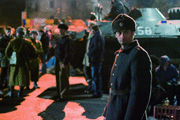 The Paper Will Be Blue, 2006. A droll and acerbic fictional corollary to Harun Farocki and Andrei Ujica’s Videograms of a Revolution, Radu Muntean’s film, like Cristi Puiu’s The Death of Mr. Lazarescu and Cristian Mungiu’s 4 Months, 3 Weeks and 2 Days is an odyssey through the crumbling institutions and broken social systems of a country in the throes of precarious transformation. Set on the evening of Nicolae Ceauşescu’s fall from power after going into hiding in the wake of widespread anti-government demonstrations, the film follows the overnight patrol of a militia unit headed by the diligent and fatherly Lt. Neagu (Adi Carauleanu) who has been dispatched to the suburbs to spot check vehicles on the main roads in order to prevent protestors from making their way to the cities. At first, the unit passes the hours uneventfully, using the roadblock as a ruse to chat up young women driving alone at night rather than as a deterrent to keep away agitators, until a group of protestors arrive at the checkpoint with the news that the television station is under siege. Overcome with patriotism and a sense of impending history, Neagu’s young recruit, Costi (Paul Ipate) impulsive decides to abandon his post and join the troops in defending the television station from apparent terrorists, leaving Neagu and the rest of the unit to try to track down the errant recruit before the end of their shift in order to avoid harsher punishment (and perhaps cancel New Years Eve leave passes) from headquarters. From the jarring, chaotic opening image of a civilian and a militiaman being accidentally killed in a barrage of confused gunfire from an apparently mistaken command to shoot (after haplessly emerging from an armored car to smoke a cigarette), Muntean illustrates the integral role of communication in the events surrounding the Revolution of 1989. Framed against Costi’s idealistic attempt to defend the television station as the symbolic last bastion of a collapsing, old order, the siege is emblematic of the critical struggle over the control of information itself, where modern day victory lies, not in the occupation of physical spaces, but in invisible – but powerful – airwaves.
The Paper Will Be Blue, 2006. A droll and acerbic fictional corollary to Harun Farocki and Andrei Ujica’s Videograms of a Revolution, Radu Muntean’s film, like Cristi Puiu’s The Death of Mr. Lazarescu and Cristian Mungiu’s 4 Months, 3 Weeks and 2 Days is an odyssey through the crumbling institutions and broken social systems of a country in the throes of precarious transformation. Set on the evening of Nicolae Ceauşescu’s fall from power after going into hiding in the wake of widespread anti-government demonstrations, the film follows the overnight patrol of a militia unit headed by the diligent and fatherly Lt. Neagu (Adi Carauleanu) who has been dispatched to the suburbs to spot check vehicles on the main roads in order to prevent protestors from making their way to the cities. At first, the unit passes the hours uneventfully, using the roadblock as a ruse to chat up young women driving alone at night rather than as a deterrent to keep away agitators, until a group of protestors arrive at the checkpoint with the news that the television station is under siege. Overcome with patriotism and a sense of impending history, Neagu’s young recruit, Costi (Paul Ipate) impulsive decides to abandon his post and join the troops in defending the television station from apparent terrorists, leaving Neagu and the rest of the unit to try to track down the errant recruit before the end of their shift in order to avoid harsher punishment (and perhaps cancel New Years Eve leave passes) from headquarters. From the jarring, chaotic opening image of a civilian and a militiaman being accidentally killed in a barrage of confused gunfire from an apparently mistaken command to shoot (after haplessly emerging from an armored car to smoke a cigarette), Muntean illustrates the integral role of communication in the events surrounding the Revolution of 1989. Framed against Costi’s idealistic attempt to defend the television station as the symbolic last bastion of a collapsing, old order, the siege is emblematic of the critical struggle over the control of information itself, where modern day victory lies, not in the occupation of physical spaces, but in invisible – but powerful – airwaves.
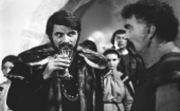 The Return of the Banished, 1979. Recalling Sergei Eisenstein’s Ivan the Terrible in its atmospheric, if tempered historical epic on the bloody reign of sixteenth century Moldavian despot, Alexandru Lapusneanu, Malvina Ursianu’s Return of the Banished is a trenchant allegory on the moral corruption and madness of absolute power. Unfolding though a series of flashbacks and flash forwards, the film opens to the image of Lapusneanu’s eldest son and heir, Bogdan, and his mother, Doamna Ruxandra (Silvia Popovici) traveling across a mountain pass in a private horse-drawn carriage, separated from the family’s entourage and Bogdan’s younger siblings, asking her how to properly address his father (George Motoi) now that he has returned from exile and, once again, ascended to the throne as the rightful ruler of Moldavia. In hindsight, the chronological ambiguity created by the film’s atemporal structure also reinforces the idea of recursive history. Once a pragmatic, magnanimous ruler eager to redefine social structure based on meritocracy rather than noble birth – a more egalitarian (and inferentially socialist) perspective that is reflected in his controversial decision to redistribute the property of a boyard who was executed for treason to his loyalists rather than allow the surviving relatives to inherit the generations-owned land – Lapusneanu soon becomes increasingly distrustful of the guarded boyards who, in turn, see the gesture as evidence of his flaunted authority and a prelude to a class war. Eager to centralize – and legitimize – his authority over Moldavia, Lapusneanu embarks on a series of strategic, pre-emptive campaigns against neighboring kingdoms and rebellious boyars to ensure his legacy, and in the process, falls deeper into the isolation and paranoia of his quest for historical immortality. In a sense, Lapusneanu’s evolution from benevolent ruler to tyrant also becomes an allegory for Nicolae Ceauşescu’s own political transformation, morphing from popular national leader willing to stand up against the power of the Soviet Union, to secretive, Stalinist head of state inspired by the claustrophobic governments of North Korea and Maoist China. Framed against Lapusneanu’s assassination of his own installed boyers, the film becomes a sobering commentary on the social revolution coming full circle in the delusive pursuit of marking history.
The Return of the Banished, 1979. Recalling Sergei Eisenstein’s Ivan the Terrible in its atmospheric, if tempered historical epic on the bloody reign of sixteenth century Moldavian despot, Alexandru Lapusneanu, Malvina Ursianu’s Return of the Banished is a trenchant allegory on the moral corruption and madness of absolute power. Unfolding though a series of flashbacks and flash forwards, the film opens to the image of Lapusneanu’s eldest son and heir, Bogdan, and his mother, Doamna Ruxandra (Silvia Popovici) traveling across a mountain pass in a private horse-drawn carriage, separated from the family’s entourage and Bogdan’s younger siblings, asking her how to properly address his father (George Motoi) now that he has returned from exile and, once again, ascended to the throne as the rightful ruler of Moldavia. In hindsight, the chronological ambiguity created by the film’s atemporal structure also reinforces the idea of recursive history. Once a pragmatic, magnanimous ruler eager to redefine social structure based on meritocracy rather than noble birth – a more egalitarian (and inferentially socialist) perspective that is reflected in his controversial decision to redistribute the property of a boyard who was executed for treason to his loyalists rather than allow the surviving relatives to inherit the generations-owned land – Lapusneanu soon becomes increasingly distrustful of the guarded boyards who, in turn, see the gesture as evidence of his flaunted authority and a prelude to a class war. Eager to centralize – and legitimize – his authority over Moldavia, Lapusneanu embarks on a series of strategic, pre-emptive campaigns against neighboring kingdoms and rebellious boyars to ensure his legacy, and in the process, falls deeper into the isolation and paranoia of his quest for historical immortality. In a sense, Lapusneanu’s evolution from benevolent ruler to tyrant also becomes an allegory for Nicolae Ceauşescu’s own political transformation, morphing from popular national leader willing to stand up against the power of the Soviet Union, to secretive, Stalinist head of state inspired by the claustrophobic governments of North Korea and Maoist China. Framed against Lapusneanu’s assassination of his own installed boyers, the film becomes a sobering commentary on the social revolution coming full circle in the delusive pursuit of marking history.
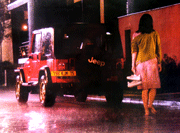 Occident, 2002. Something of a cross between Julie Bertucelli’s Since Otar Left and Bohdan Slama’s Something Like Happiness in its wry and affectionate portrait of Eastern European diaspora after the collapse of the Soviet Union, Cristian Mungiu’s refined and ingeniously constructed first feature film, Occident also evokes the spirit of Krzysztof Kieslowski in its bittersweet, delicately interconnected tale of chance, coincidence, and longing. Similar to the three part structure of Nae Caranfil’s Don’t Lean Out the Window, the interlocking chapters of Occident chronicle the same unrequited tale, each gradually revealed through the peeled layers of the characters’ own unfolded, often comical stories of miscommunication, failed connection, and lost opportunity: an underemployed man, Luci (Alexandru Papadopol) who tries to win back the affections of his girlfriend, Sorina (Anca-Ioana Androne) after being evicted from their apartment (and who, in turn, has since moved in with their passing Belgian samaritan, Jerome (Samuel Tastet) after Luci is unexpectedly hit on the head with a flying bottle); his frail aunt Leana (Eugenia Bosânceanu) who has decided to leave everything for him in her will in the absence of her estranged son in Germany; his friend Gica (Ioan Gyuri Pascu) who tries to reunite the couple through unorthodox means (often with hilarious consequences); his co-worker (and fellow product mascot), Mihaela (Tania Popa), recently left at the altar by her fiancé on their wedding day, who sees in Luci a kindred spirit in their mutually wounded hearts; Mihaela’s father (Dorel Visan), a retiring police officer (and throwback to Securitate-styled surveillance tactics) who tries to feel useful by setting things right with his only child, searching for a suitable, foreign husband who will help her establish a new life elsewhere. Ever converging towards a flight away from the country (whether out of romantic impulse, career opportunity, or even adoption), Luci’s quixotic quest becomes integrally connected to the ephemeral pursuit of a distant, idealized West itself, where destiny lies, not in the alignment of fate, but in its sad divergence.
Occident, 2002. Something of a cross between Julie Bertucelli’s Since Otar Left and Bohdan Slama’s Something Like Happiness in its wry and affectionate portrait of Eastern European diaspora after the collapse of the Soviet Union, Cristian Mungiu’s refined and ingeniously constructed first feature film, Occident also evokes the spirit of Krzysztof Kieslowski in its bittersweet, delicately interconnected tale of chance, coincidence, and longing. Similar to the three part structure of Nae Caranfil’s Don’t Lean Out the Window, the interlocking chapters of Occident chronicle the same unrequited tale, each gradually revealed through the peeled layers of the characters’ own unfolded, often comical stories of miscommunication, failed connection, and lost opportunity: an underemployed man, Luci (Alexandru Papadopol) who tries to win back the affections of his girlfriend, Sorina (Anca-Ioana Androne) after being evicted from their apartment (and who, in turn, has since moved in with their passing Belgian samaritan, Jerome (Samuel Tastet) after Luci is unexpectedly hit on the head with a flying bottle); his frail aunt Leana (Eugenia Bosânceanu) who has decided to leave everything for him in her will in the absence of her estranged son in Germany; his friend Gica (Ioan Gyuri Pascu) who tries to reunite the couple through unorthodox means (often with hilarious consequences); his co-worker (and fellow product mascot), Mihaela (Tania Popa), recently left at the altar by her fiancé on their wedding day, who sees in Luci a kindred spirit in their mutually wounded hearts; Mihaela’s father (Dorel Visan), a retiring police officer (and throwback to Securitate-styled surveillance tactics) who tries to feel useful by setting things right with his only child, searching for a suitable, foreign husband who will help her establish a new life elsewhere. Ever converging towards a flight away from the country (whether out of romantic impulse, career opportunity, or even adoption), Luci’s quixotic quest becomes integrally connected to the ephemeral pursuit of a distant, idealized West itself, where destiny lies, not in the alignment of fate, but in its sad divergence.
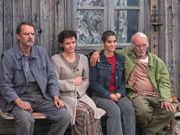 Ryna, 2005. In a way, Ruxandra Zenide’s debut film, Ryna suggests Claudia Llosa’s Madeinusa in its allegorical tale of a young woman coming of age under a moral vacuum of isolation, lawlessness, and repressive authority. Set in a poor rural community along the Danube delta where the town’s depressed economy is as tied to the commerce of fishing as it is to preying on the gullibility of others (a stagnation that is also implied in the grandfather’s life savings of useless, communist-era currency), the film chronicles Ryna’s (Doroteea Petre) process of maturation and self-awareness after a fateful encounter with a visiting French doctoral candidate, George (Matthieu Rozé) who has come to the region on an anthropological research study of the town’s inhabitants in search of the origin of Latin. The only child of a tyrannical and increasingly desperate gas station and garage owner, Biri (Valentin Popescu), Ryna has obediently, if reluctantly, acquiesced to her father’s whims, keeping her hair closed cropped and donning an oversized mechanics coveralls (but whose beauty, nevertheless, catches the eye of the passing researcher and the mailman (Theodor Delciu)), as well as sabotaging parked cars and inflating charges by diagnosing non-existent mechanical problems to unsuspecting stranded motorists. Facing the loss of their primary source of revenue when the town bypass road is completed to accommodate better interstate traffic, Biri has begun to ingratiate himself into the company of the town mayor in order to obtain a permit to relocate his business new the new road, a nefarious alliance that grows even more sinister when the mayor, still continuing to delay approval of the permit in order to extract additional favors from Biri, takes a romantic interest in young Ryna. Like Salvador, the passing stranger in Madeinusa, George becomes a catalyst for Ryna’s awakening, representing the possibility of connection, liberation, and self-identity away from the oppressive captivity of the insular town – the link to a transcendent elsewhere.
Ryna, 2005. In a way, Ruxandra Zenide’s debut film, Ryna suggests Claudia Llosa’s Madeinusa in its allegorical tale of a young woman coming of age under a moral vacuum of isolation, lawlessness, and repressive authority. Set in a poor rural community along the Danube delta where the town’s depressed economy is as tied to the commerce of fishing as it is to preying on the gullibility of others (a stagnation that is also implied in the grandfather’s life savings of useless, communist-era currency), the film chronicles Ryna’s (Doroteea Petre) process of maturation and self-awareness after a fateful encounter with a visiting French doctoral candidate, George (Matthieu Rozé) who has come to the region on an anthropological research study of the town’s inhabitants in search of the origin of Latin. The only child of a tyrannical and increasingly desperate gas station and garage owner, Biri (Valentin Popescu), Ryna has obediently, if reluctantly, acquiesced to her father’s whims, keeping her hair closed cropped and donning an oversized mechanics coveralls (but whose beauty, nevertheless, catches the eye of the passing researcher and the mailman (Theodor Delciu)), as well as sabotaging parked cars and inflating charges by diagnosing non-existent mechanical problems to unsuspecting stranded motorists. Facing the loss of their primary source of revenue when the town bypass road is completed to accommodate better interstate traffic, Biri has begun to ingratiate himself into the company of the town mayor in order to obtain a permit to relocate his business new the new road, a nefarious alliance that grows even more sinister when the mayor, still continuing to delay approval of the permit in order to extract additional favors from Biri, takes a romantic interest in young Ryna. Like Salvador, the passing stranger in Madeinusa, George becomes a catalyst for Ryna’s awakening, representing the possibility of connection, liberation, and self-identity away from the oppressive captivity of the insular town – the link to a transcendent elsewhere.
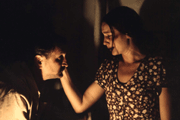 Maria, 2003. Channeling the spirit of Italian neorealism in its bleak and unrelenting portrait of abject poverty, Peter Calin Netzer’s film is a provocative and articulate social interrogation on the role of globalization, international charity, and the media on the socioeconomic polarization of the working class. Based on a true story (an sad truth that is reinforced in the film’s postscript dedication to the real-life Maria who lived from 1962 to 1995), the film resurrects the specter of Ceauşescu’s short-sighted natality policy in the opening shot of a pregnant Maria (Diana Dumbrava) picnicking with her six children (and underscored by her son’s innocent reiteration of a neighbor’s comparison to the family as breeding like rabbits), an idyllic afternoon that soon takes a somber turn when she starts to go into labor in the open field. Cutting to the shot of her husband Ion (Serban Ionescu), a balloon factory foreman listening to the news with his enterprising friend Milco (Horatiu Malaele) that the factory’s new owners have rejected their counter-offer and instead, have decided to immediately disband the union and shut down operations (allotting each worker two boxes of balloons as compensation in lieu of reconciling the former owner’s debt of unpaid back wages), the sense of inescapable misfortune and cruel fate is foretold in Ion’s all too frequent bouts of drunkenness, violent rages, and reckless gambling following his unexpected unemployment (note the interrelated role of delusive games of chance and insurmountable debt that also pervades Djibril Diop Mambéty’s Le Franc). Struggling to raise the family singlehandedly in the wake of Ion’s increasing abuse and abandonment, she finds momentary solace in the company of her resourceful and good-hearted neighbor Maia (Luminita Gheorghiu), until a tragedy drives her deeper into isolation and despair. Far from a facile portrait of domestic abuse and marginalization, Maria proves to be a potent indictment of the dysfunctional, post-communist society itself – in its abandonment of humanist ideals in the pursuit of wealth, and even media responsibility in the tidy repackaging of human interest stories as entertainment (an exploitation that, in the wake of reality television, proves especially relevant). This sense of moral self-assessment is perhaps best encapsulated in the shot of Maria appraising her looks in front of a full-length mirror – an act that is ominously repeated by her daughter – that is also evoked in her transmitted, real-time television image from a video camera connection at a shop window: a sobering reflection of our complicity in the trivialization of human suffering as commodity and spectacle.
Maria, 2003. Channeling the spirit of Italian neorealism in its bleak and unrelenting portrait of abject poverty, Peter Calin Netzer’s film is a provocative and articulate social interrogation on the role of globalization, international charity, and the media on the socioeconomic polarization of the working class. Based on a true story (an sad truth that is reinforced in the film’s postscript dedication to the real-life Maria who lived from 1962 to 1995), the film resurrects the specter of Ceauşescu’s short-sighted natality policy in the opening shot of a pregnant Maria (Diana Dumbrava) picnicking with her six children (and underscored by her son’s innocent reiteration of a neighbor’s comparison to the family as breeding like rabbits), an idyllic afternoon that soon takes a somber turn when she starts to go into labor in the open field. Cutting to the shot of her husband Ion (Serban Ionescu), a balloon factory foreman listening to the news with his enterprising friend Milco (Horatiu Malaele) that the factory’s new owners have rejected their counter-offer and instead, have decided to immediately disband the union and shut down operations (allotting each worker two boxes of balloons as compensation in lieu of reconciling the former owner’s debt of unpaid back wages), the sense of inescapable misfortune and cruel fate is foretold in Ion’s all too frequent bouts of drunkenness, violent rages, and reckless gambling following his unexpected unemployment (note the interrelated role of delusive games of chance and insurmountable debt that also pervades Djibril Diop Mambéty’s Le Franc). Struggling to raise the family singlehandedly in the wake of Ion’s increasing abuse and abandonment, she finds momentary solace in the company of her resourceful and good-hearted neighbor Maia (Luminita Gheorghiu), until a tragedy drives her deeper into isolation and despair. Far from a facile portrait of domestic abuse and marginalization, Maria proves to be a potent indictment of the dysfunctional, post-communist society itself – in its abandonment of humanist ideals in the pursuit of wealth, and even media responsibility in the tidy repackaging of human interest stories as entertainment (an exploitation that, in the wake of reality television, proves especially relevant). This sense of moral self-assessment is perhaps best encapsulated in the shot of Maria appraising her looks in front of a full-length mirror – an act that is ominously repeated by her daughter – that is also evoked in her transmitted, real-time television image from a video camera connection at a shop window: a sobering reflection of our complicity in the trivialization of human suffering as commodity and spectacle.
 Don’t Lean Out the Window, 1994. A thematic structure that continues to surface in several of the post 1989 Revolution films during the Shining Through a Long, Dark Night: Romanian Cinema, Then and Now series is the use of an intertwining, circular narrative as a metaphor for national self-reflection – and re-evaluation – in the aftermath of the Nicolae Ceauşescu regime and the collapse of the Soviet Union, and this aesthetic is reflected in the composition of Nae Caranfil’s watershed film, Don’t Lean Out the Window, a story in three parts showing the intersecting lives of young people in transition. The film presciently opens to the idyllic image soldiers conducting their field maneuvers on an open field near the side of the road, their mock drills briefly interrupted by the sight of a young woman looking out the window of a nearby passing train. In hindsight, this image crystallizes the sense of transience and coincidence that would briefly connect the lives of Cristina (Nathalie Bonnifay) a student nearing graduation, Dinu (George Alexandru), an itinerant stage actor (and erstwhile film star) separated from his wife, and Cristina’s suitor, Horatiu (Marius Stanescu) a soldier serving the final days of his compulsory military service in the small town. Set in the waning days of communism, the sense of disorder and collapse of authority is established in the earliest shots of the first chapter, The Student, as a teacher’s rote regurgitation on the state policy of natality plays out before an unruly classroom as students openly distribute birth control pills obtained from the black market. Alternately occupying her time sorting potatoes for transportation at a collective farm and preparing for her university admissions exams with the bookish Horatiu in a decommissioned train car at an abandoned rail yard, Cristina’s life in the small town seems equally derailed until the dashing actor, Dinu approaches her with an enigmatic question over the authorship of some secret admirer letters, and with it, the possibility of life away from the insular town. Infused with a dry humor and situational absurdity that has also become characteristic of certain noteworthy, contemporary Eastern European cinema (most notably, Béla Tarr and compatriot Cristi Puiu), the film is a well crafted, if occasionally caricatured portrait of a nation at a profound political and cultural crossroads, where the anonymous, if familiar structure of repression has begun to collapse under the anarchic weight of an uncertain, encroaching liberation and (re)emerging identity.
Don’t Lean Out the Window, 1994. A thematic structure that continues to surface in several of the post 1989 Revolution films during the Shining Through a Long, Dark Night: Romanian Cinema, Then and Now series is the use of an intertwining, circular narrative as a metaphor for national self-reflection – and re-evaluation – in the aftermath of the Nicolae Ceauşescu regime and the collapse of the Soviet Union, and this aesthetic is reflected in the composition of Nae Caranfil’s watershed film, Don’t Lean Out the Window, a story in three parts showing the intersecting lives of young people in transition. The film presciently opens to the idyllic image soldiers conducting their field maneuvers on an open field near the side of the road, their mock drills briefly interrupted by the sight of a young woman looking out the window of a nearby passing train. In hindsight, this image crystallizes the sense of transience and coincidence that would briefly connect the lives of Cristina (Nathalie Bonnifay) a student nearing graduation, Dinu (George Alexandru), an itinerant stage actor (and erstwhile film star) separated from his wife, and Cristina’s suitor, Horatiu (Marius Stanescu) a soldier serving the final days of his compulsory military service in the small town. Set in the waning days of communism, the sense of disorder and collapse of authority is established in the earliest shots of the first chapter, The Student, as a teacher’s rote regurgitation on the state policy of natality plays out before an unruly classroom as students openly distribute birth control pills obtained from the black market. Alternately occupying her time sorting potatoes for transportation at a collective farm and preparing for her university admissions exams with the bookish Horatiu in a decommissioned train car at an abandoned rail yard, Cristina’s life in the small town seems equally derailed until the dashing actor, Dinu approaches her with an enigmatic question over the authorship of some secret admirer letters, and with it, the possibility of life away from the insular town. Infused with a dry humor and situational absurdity that has also become characteristic of certain noteworthy, contemporary Eastern European cinema (most notably, Béla Tarr and compatriot Cristi Puiu), the film is a well crafted, if occasionally caricatured portrait of a nation at a profound political and cultural crossroads, where the anonymous, if familiar structure of repression has begun to collapse under the anarchic weight of an uncertain, encroaching liberation and (re)emerging identity.
Acquarello, 2008 [reprinted]